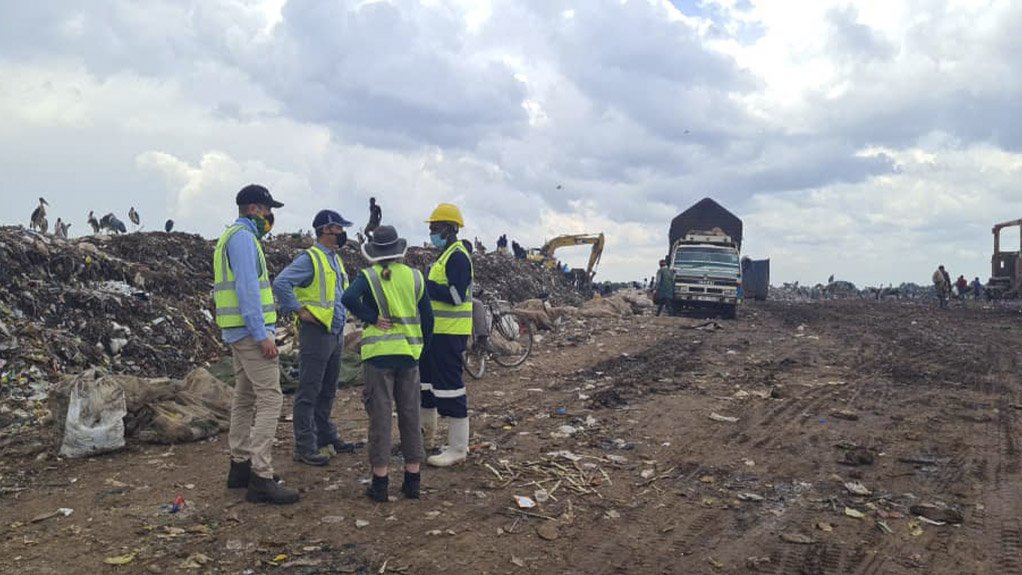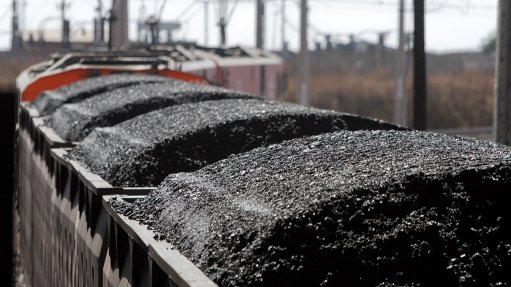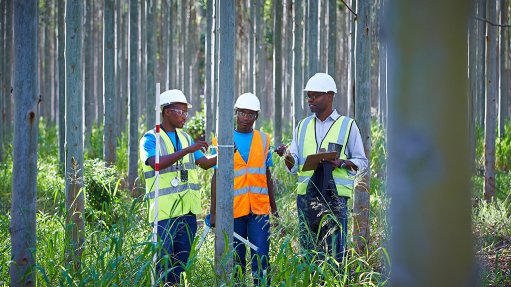JG Afrika with RWA Group and Cardno International Development helps Kampala, Uganda towards implementing world-class IWM strategy and diversion


The project is being done under the Cities and Infrastructure for Growth programme funded by UKAid and implemented by Cardno International Development. JG Afrika was appointed to provide technical and specialised services
This article has been supplied as a media statement and is not written by Creamer Media. It may be available only for a limited time on this website.
JG Afrika, a leading engineering and environmental consultancy, is part of a professional team that is supporting the Greater Kampala Metropolitan Area (GKMA) towards implementing a robust solid waste-management plan for Uganda’s rapidly growing national and commercial capital and their neighbouring authorities, as a regional and collective approach.
Richard Emery, a JG Afrika Technical Director and Manager of Municipal Infrastructure and Integrated Waste Management (IWM), and the JG Afrika specialist Team including Dr Jefrey Pilusa (JG Afrika organic waste specialist and process engineer), are working with the greater team that have been deployed to work on this project. As one of the foremost IWM experts in South Africa, Richard together with Jefrey, bring extensive technical skills and learning in the design and implementation of IWM projects to this assignment.
“The GKMA is facing very similar waste-management challenges that South African cities do, and it has a comparable society although it appears are slightly more consumer orientated. A key difference, however, is that the GKMA has limited technical capacity required to implement its vast academic knowledge and real understanding of international trends and technologies. This is compared to South Africa’s more engineered-managed systems, which we aim to help GKMA implement to better manage solid waste diversion and systems in the area. The project will also assist GKMA in honouring its commitment to reducing carbon emissions as articulated in the Kampala Climate Change Action Strategy, a key instrument that it uses to help mainstream climate change response in all city services,” Emery says.
The project is being done under the Cities and Infrastructure for Growth program[4] funded by UKAid and implemented by, Cardno International Development, which appointed JG Afrika to provide technical and specialised services based on the firm’s impressive track-record designing and implementing unique IWM solutions and project implementation (design, construction, operation).
Currently in the concept engineering design phase, the project focuses on diverting solid waste away from the Kiteezi landfill and allow businesses and investors to benefit from some of these recovered materials, whilst in the interim consideration is towards
establishing a methane gas-to-energy plant of at least 2MW in capacity on site due to the high-organic content of the waste stream.
Kiteezi landfill is located in Nangabo sub-county in Wakiso district and is Uganda’s largest and main landfill. About 14,5ha in size with its highest end rising up to 10m, it is partially lined and features a leachate-treatment plant that is no longer functioning as optimally as it should and as designed.
The capacity of the landfill has been exhausted. Therefore, the local Authorities are trying to find a suitable alternative site where large quantities of solid waste generated by the GKMA constituents can be disposed of as an interim solution. This remains a challenge considering limited municipal land that is available for this purpose. The GKMA comprises very densified urbanised and low-density rural areas that are very scattered. Most of the land in the GKMA is in private hands and owners are reluctant to sell it to the municipality at a fair price, more so to use as a landfill site. Meanwhile, as a very short-term measure, small pieces of land are being earmarked by the local Authorities to help dispose of well over 28 000t of waste that is still being sent to the landfill every month. Some of the waste is being disposed of at unauthorised areas posing severe environmental and health risks to the general public.
Notably, most of the waste generated in the area consists of organic material, considering the strong agricultural-based communities in the country. Located on the equator, the country has a conducive climate and fertile soils that enable fruit and vegetable production for the greater part of the year. For example, bananas, mangoes, citrus, pineapples and tomatoes are grown on small subsistence plots and sold at the many street-side markets in the GKMA.
There are hundreds of informal waste pickers who earn a livelihood collecting papers, containers and plastic at Kiteezi landfill for recycling purposes. The inorganic waste, consisting mainly of paper and plastic, is compiled in very large bags that are rolled to collection trucks. This recovered material is then transported to various areas in the GKMA where it is re-used.
The waste diversion component of the project will potentially entail finding appropriate ways of using this organic resource as opposed to landfilling it. There are a host of potential landfill diversion solutions that still need to be assessed by JG Afrika, RWA and Cardno, ranging from home composting through to larger community-based or regional projects. As Emery notes, no two IWM projects are alike. They need to be adapted to the environment and the communities that they serve to be successful.
Through this project, Uganda is also attempting to keep pace with the global trend of better managing residual materials. “The landfilling of these materials is harmful to the environment and causes serious health problems. Many countries are, thus, at the cusp of ensuring that all organic waste is diverted from landfills. In South Africa, for example, the Western Cape Provincial Government aims to completely eliminate organic waste from its landfills by 2027. This is a very ambitious target that could be emulated in other areas of the country via novel IWM projects,” he says.
One of the main challenges of the project will be determining how best to manage the potential socio-economic impact that the gradual closure of Kiteezi landfill site will have on the many informal pickers while organic waste is being diverted. There are numerous scenarios that need to be thoroughly assessed, and they will all require careful and extensive planning before being implemented. For example, one option is to keep the landfill site open to these communities until materials become too difficult to recover. The informal waste pickers will slowly find other means of sustaining themselves and the landfill can, therefore, be closed without any further socio-economic impact. Another option is to help the affected communities establish small businesses, such as road-side markets and stalls, to sustain themselves as Kiteezi landfill site is gradually closed.
Timelines for the implementation of the IWM project are still uncertain. They are dependent upon the findings of the environmental and social impact assessments and the ability of the GKMA to finance the project, including the proposed development of a methane gas-to-energy plant as a potential project.
However, the country has been very successful in attracting private and grant funding for projects, to date. Through municipalities, this is also used to fund feasibility studies. The country already has many bankable projects that are attracting further private investors and grant funding. This project is especially enticing considering the significant demand for IWM in the city with many private participants having already identified an opportunity to become involved in providing essential services on behalf of the GKMA. The country also needs more renewable energy to help meet its carbon reduction targets and it has a developing electricity distribution grid to support these projects. These are further factors that potential funders may find appealing.
“I remain very impressed with the country, especially its wealth of academic knowledge, which includes an intimate understanding of international trends and technologies. This continues to shine through in my interactions with relevant stakeholders. I believe Uganda is poised for great things,” Emery concludes.
Comments
Press Office
Announcements
What's On
Subscribe to improve your user experience...
Option 1 (equivalent of R125 a month):
Receive a weekly copy of Creamer Media's Engineering News & Mining Weekly magazine
(print copy for those in South Africa and e-magazine for those outside of South Africa)
Receive daily email newsletters
Access to full search results
Access archive of magazine back copies
Access to Projects in Progress
Access to ONE Research Report of your choice in PDF format
Option 2 (equivalent of R375 a month):
All benefits from Option 1
PLUS
Access to Creamer Media's Research Channel Africa for ALL Research Reports, in PDF format, on various industrial and mining sectors
including Electricity; Water; Energy Transition; Hydrogen; Roads, Rail and Ports; Coal; Gold; Platinum; Battery Metals; etc.
Already a subscriber?
Forgotten your password?
Receive weekly copy of Creamer Media's Engineering News & Mining Weekly magazine (print copy for those in South Africa and e-magazine for those outside of South Africa)
➕
Recieve daily email newsletters
➕
Access to full search results
➕
Access archive of magazine back copies
➕
Access to Projects in Progress
➕
Access to ONE Research Report of your choice in PDF format
RESEARCH CHANNEL AFRICA
R4500 (equivalent of R375 a month)
SUBSCRIBEAll benefits from Option 1
➕
Access to Creamer Media's Research Channel Africa for ALL Research Reports on various industrial and mining sectors, in PDF format, including on:
Electricity
➕
Water
➕
Energy Transition
➕
Hydrogen
➕
Roads, Rail and Ports
➕
Coal
➕
Gold
➕
Platinum
➕
Battery Metals
➕
etc.
Receive all benefits from Option 1 or Option 2 delivered to numerous people at your company
➕
Multiple User names and Passwords for simultaneous log-ins
➕
Intranet integration access to all in your organisation



















